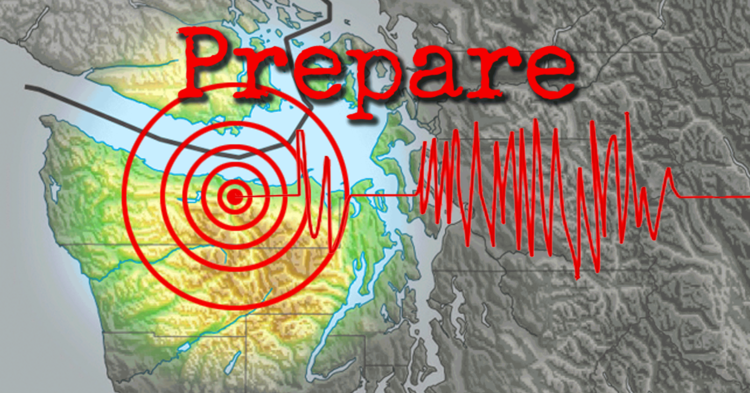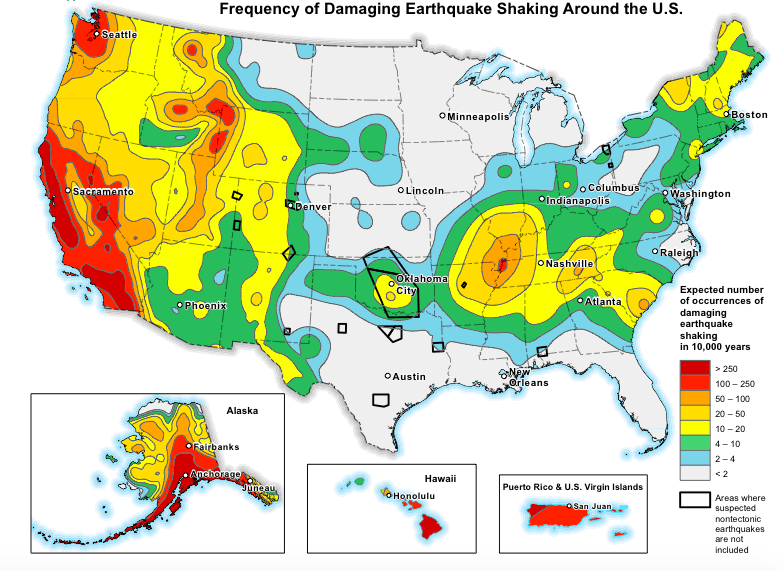
Earthquakes are unlike other natural disasters, such as wildfires or hurricanes, that have seasons or warnings. Earthquakes can happen almost anywhere at any time.
A basic homeowners insurance policy does not cover damage caused by earthquakes, though it will cover fire damage that occurs as a result of one. Otherwise, to actually cover your home and belongings from the direct effects of a quake, you’ll need a separate earthquake insurance policy.
With earthquake insurance, your home, personal belongings, and additional living expenses (if you can’t live in your home after a quake) are all covered in the event of an earthquake.
If you're on the fence about whether earthquake insurance makes sense for you, start by taking a look at your home's earthquake risk. You can get an idea of how close you live to a fault line by looking at the National Seismic Hazard Map.
You might live closer to a fault line than you originally thought. You can weigh the risks against the premiums to decide if earthquake insurance makes sense for your home and finances. Call us at 714-992-2390 to discuss, we can answer your questions and address your concerns.

HOW CAN YOU PREPARE?
□ Learn the fire evacuation and earthquake plans for buildings you occupy.
□ In each room of your home, workplace and/or school, pick a safe place. This could be under a piece of furniture or against an interior wall away from windows or tall furniture that could fall on you.
□ Drop, cover and hold: practice this in each safe place. If you do not have sturdy furniture to hold on to, sit on the floor next to an interior wall and cover your head and neck with your arms.
□ Keep a flashlight and sturdy shoes by each bed.
□ Make sure your home is securely anchored to its foundation.
□ Bolt and brace water heaters and gas appliances to wall studs.
□ Bolt bookcases and other tall furniture to wall studs.
□ Hang heavy items (pictures and mirrors) away from anywhere people sleep or sit (couches, beds etc.).
□ Brace overhead light fixtures.
□ Install strong latches or bolts on cabinets. Large or heavy items should be closest to the floor.
□ Learn how to shut off the gas valves in your home and keep a wrench handy.
□ Before beginning new construction, learn about your area’s seismic building standards and land use codes.
□ Keep and maintain an emergency supplies kit in an easy-to-access location.
WHAT SHOULD YOU DO?
If you are inside when the shaking starts …
□ Drop, cover and hold on. Move as little as possible.
□ If you are in bed, stay there, curl up and hold on. Protect your head with a pillow.
□ Stay away from windows to avoid being injured by shattered glass.
□ Stay indoors until the shaking stops and you are sure it is safe to exit.
□ If you must leave the building after the shaking stops, use stairs rather than an elevator in case of power outages or other damage if there are aftershocks.
□ Fire alarms and sprinkler systems frequently go off in buildings during an earthquake, even if there is no fire.
If you are outside when the shaking starts …
□ Find a clear spot and drop to the ground. Stay there until the shaking stops (away from buildings, power lines, trees, streetlights).
□ If you are in a vehicle, pull over to a clear location and stop. Avoid bridges, overpasses and power lines if possible. Stay inside with your seatbelt fastened until the shaking stops. Then, drive carefully, avoiding bridges and ramps that may have been damaged.
□ If a power line falls on your vehicle, do not get out. Wait for assistance.
□ If you are in a mountainous area or near unstable slopes or cliffs, be alert for falling rocks and other debris. Landslides are often triggered by earthquakes.
□ The disaster may continue after. Expect and prepare for potential aftershocks, landslides or even a tsunami if near the ocean.
□ Each time you feel an aftershock, drop, cover and hold on. They can continue to occur frequently -minutes, days, weeks and even months following an earthquake.
□ Check for injuries and get first aid, if necessary, then help injured or trapped persons after.
□ Quickly check for damage in and around the home. Get everyone out if it is unsafe.
□ To protect against injury from broken objects, wear sturdy shoes, long pants, a long-sleeved shirt and work gloves.
□ For updated emergency information and instructions, listen to a portable, battery-operated or hand-crank radio.
□ Check the telephones in your home or workplace for a dial tone. Make brief calls to report life-threatening emergencies.
□ The most common hazard after an earthquake is fire. Check for and extinguish small fires.
□ Clean up any spilled gasoline or other flammable liquids immediately.
□ As contents may have shifted, open closet and cabinet doors carefully.
□ Help those who require special assistance (infants, children and the elderly or disabled).
□ Stay out of damaged areas and watch out for fallen power lines or broken gas lines.
□ Keep animals with you and under control.
□ Stay out of damaged buildings.
□ Return home only when authorities say it is safe to do so. Check walls, floors, doors, staircases and windows for damage and use extreme caution.
□ When driving after an earthquake be careful and anticipate traffic light outages.
□ Let your family know you’re safe.
